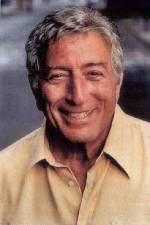| B i o g r a p h y |
 Real name: Anthony Dominick Benedetto.
Real name: Anthony Dominick Benedetto.Born: Aug 3, 1926 in Queens, NY.
Genres: Vocal.
Styles: Vocal Jazz, Traditional Pop, Ballads, Show Tunes.
Instruments: Vocals
..:: audio-music dot info ::.. |
| B i o g r a p h y |
 Real name: Anthony Dominick Benedetto.
Real name: Anthony Dominick Benedetto.Any discussion of Tony Bennett within the context of a book on jazz
ought to start with the disclaimer that he is not, never was, and
doesn't claim to be, a "jazz singer" per se. However, there isn't any
question that Bennett has always felt a kinship with jazz musicians and
has collaborated with them several times in his long career, often with
delightful results. Though not an improviser, Bennett could always
follow the contours of a jazz rhythm section with confidently jazzy
inflections; indeed, he sounds absolutely ebullient whenever he records
with jazzers. Bennett's pianist and musical director since the 1950s,
Ralph Sharon, is a solid, dependable jazzman in his own right, and has
occasionally steered his boss away from the all-American easy-listening
ballad into a more jazz-oriented setting. Bennett counts among his
influences Art Tatum, from whom he drew ideas on phrasing and
breathing, Mildred Bailey for her relaxed delivery, and of course, the
inevitable Billie Holiday and Frank Sinatra, who once proclaimed
Bennett to be the best singer in the business. Indeed, as Sinatra's
voice aged, Bennett found himself in the position of being the leading
purveyor of American popular songs by 1990.
The jazz influence on Bennett was inevitable for a child of the big
band era, and his teacher Miriam Spier urged him to listen to
instrumentalists instead of singers for inspiration. He worked as a
singing waiter as a teenager, sang with military bands during the war,
and appeared on Arthur Godfrey's Talent Scouts. Bob Hope heard him
performing at a New York nightclub with Pearl Bailey in 1950 and booked
him into his show at the Paramount Theatre, where his rendition of
"Boulevard of Broken Dreams" attracted the attention of Columbia
Records head honcho Mitch Miller. After some early setbacks, Bennett
started to put together a string of hit singles like "Because of You,"
"Rags to Riches" and a pioneering pop cover of a Hank Williams tune,
"Cold, Cold Heart" — all of which went to number one. With his
commercial flanks covered, Bennett was occasionally allowed to use the
LP format to experiment with jazz in the 1950s, recording with the
likes of the Count Basie Orchestra, Ralph Burns, Bobby Hackett, Stan
Getz and Zoot Sims. Perhaps his most successful and unusual experiment
was a lively 1957 album called The Beat of My Heart, dominated by the
drums of Chico Hamilton, Art Blakey and Jo Jones and populated by the
likes of Nat Adderley, Herbie Mann, Al Cohn, Kai Winding and Milt
Hinton.
Bennett got through the first decade and a half of the rock & roll
invasion mostly unscathed, thanks in part to an occasional smash hit
like "I Left My Heart In San Francisco" that would thrust his name back
into the public consciousness. But the pressures of resisting the rock
trend drove Bennett away from Columbia in 1972, and after a brief
period with MGM, he made several albums for his own Improv label, DRG
and Fantasy, collaborating with Ruby Braff and Marian and Jimmy
McPartland and making two now-revered duet albums with Bill Evans. From
1979 to 1986, however, he was unable to secure a recording contract on
his terms, and interviews from the period found him quite bitter about
the dominance of rock in the music business.
However, once his son Danny took over his management and started to
sell him to a younger audience, Bennett's career underwent a remarkable
resurrection. Upon re-signing with Columbia in 1986, Bennett started a
new carefully produced and planned series of albums, beginning with the
ostentatiously titled The Art of Excellence. In 1987, a fascinating
compilation from the '50s and '60s entitled Jazz helped remind jazz
fans of his old ties, and the new album Bennett/Berlin was graced by
the presence of George Benson, Dizzy Gillespie and Dexter Gordon. Next,
he became an unlikely favorite of Generation X, more perhaps for his
stubborn refusal to conform to fashion than for his music, and an
appearance on MTV Unplugged in 1993 was turned into a hit album.
Bennett still appears frequently at jazz festivals in tandem with big
bands or the Ralph Sharon Trio, and his current reputation as an
artiste is buttressed by the fact that he is also a skilled painter,
signing his works with his original name, Anthony Benedetto.
Playground, a collection of songs aimed at younger listeners, followed
in 1998.
| A l b u m s |